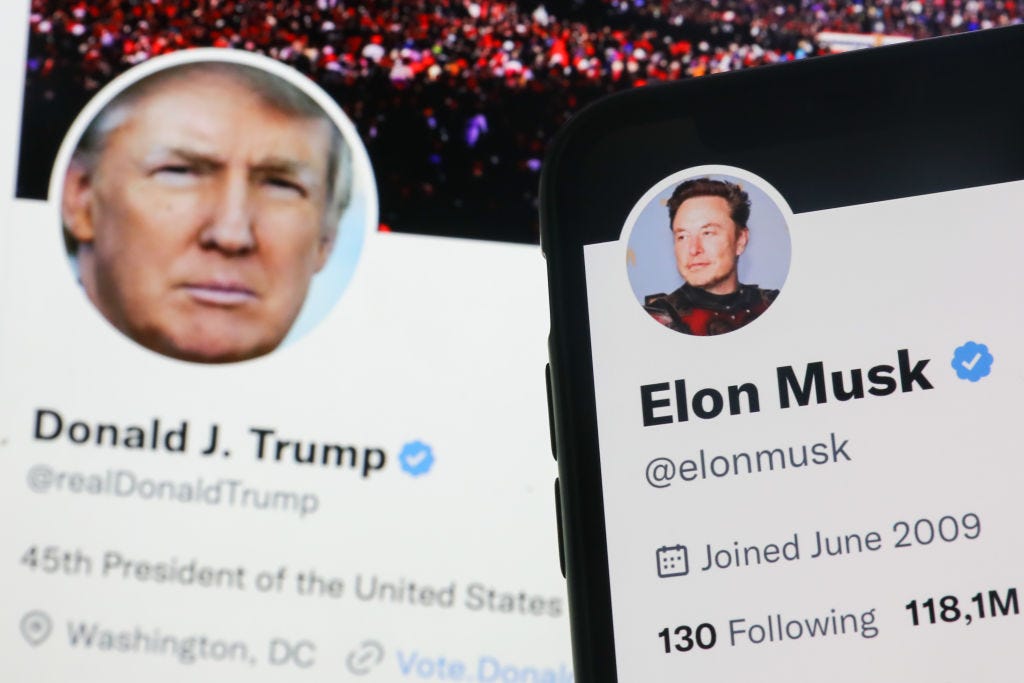A line-by-line fact check of the Musk-Trump interview
Both men told some pretty serious tall tales about climate change.

Donald Trump told some wild lies about climate change in his two-hour live-streamed conversation with Elon Musk last night.
He falsely said that sea levels would only rise “one-eighth of an inch over the next 400 years.” In reality, sea levels are currently rising at more than a one-eighth of an inch every year.
He also falsely said that sea level rise would bring “more oceanfront property” to the country—an almost stunningly ignorant claim, as sea level rise makes land masses smaller. It’s basic geometry, as The Washington Post points out.
But even more interesting than Trump’s asinine climate claims were the climate falsehoods spewed by Musk, a man who's been lauded as a climate hero by many in the press and even some readers of this newsletter.
So today, I’m going to fact-check the entire climate portion of Musk’s conversation with Trump, which went on a surprisingly long time and covered a range of topics from Arctic drilling to electric cars.
Instead of summarizing their claims, I’m going to present the climate portion of the transcript to you in full, with my reactions and fact-checks scattered throughout. Musk and Trump’s conversation will be in bold; my reactions and fact-checks will be non-bold. I’ve also cleaned up the transcript a little to eliminate unnecessary filler words, to make it easier to read/understand.
Enjoy.
MUSK: I want to say something about my views on climate change and oil and gas, because I think it’s probably different from what most people would assume. My views are actually pretty moderate in this regard, which is that I don’t think we should vilify the oil and gas industry and the people that have worked very hard in those industries to provide the necessary energy to support the economy.
It’s funny: When politicians and activists rail against Big Pharma for lying to the public about opioid safety, everyone seems to understand that they’re attacking executives, not pharmacists. But when politicians and activists rail against Big Oil for lying to the public about climate change, everyone seems to believe they’re attacking fossil fuel workers.
This isn’t an accident. It’s a savvy misdirection tactic Republicans use to derail substantive conversations about oil industry deception and climate policy delay. Here, Musk is trying to position himself as “moderate” and “different” because he opposes the demonization of fossil fuel workers. But this is a view shared wholeheartedly by the climate left, which demonizes the actions of the ruling class, not the working class.
In reality, Democrats and climate activists have been very careful to direct their criticisms not at fossil fuel workers, but at fossil fuel executives who spent decades lying about the climate harms of their products and spending billions to prevent ecosystem-saving policies.
But Musk doesn’t want to talk about that. So he pulls out a straw man argument and moves on.
MUSK: And if we were to stop using oil and gas right now, we would all be starving and the economy would collapse.
This is another straw man argument and misdirection tactic—no Democratic politician or climate activist is arguing to “stop using oil and gas right now.” They argue for a “phase-out” and/or “transition away from” fossil fuels to reach net zero emissions by 2050, which is in line with what climate scientists say is necessary to preserve a livable climate.
It’s telling that the only way Musk can talk about climate change is by mischaracterizing climate activists’ positions.
MUSK: So it’s you know, I don’t think it’s right to sort of vilify the oil and gas industry. And the world has a certain demand for oil and gas, and it’s probably better if the United States provides that than some other countries. And it would help with prosperity in the U.S.


